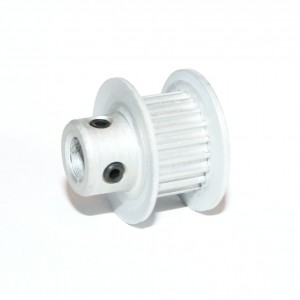Delrin Timing Pulleys
Timing pulleys provide hundreds of applications for motion control, power transmission and drive systems. These parts are manufactured from various materials, which include aluminum, steel and plastic polymers, each of which has unique qualities and specifications. Delrin is the trade name for Dupont’s brand of plastics that are generically called acetyl homopolymers. This polymer of formaldehyde provides superior tensile strength and works well for manufacturing all types of pulleys, gears, washers, wheels and bearings. Delrin resists chemical corrosion, has a high melting point and provides self-lubrication.
Delrin Characteristics
Delrin characteristics include stiffness and strength, so parts made from the plastic resist abrasions while providing a high degree of functionality. However, since the material is a thermoplastic, you can machine parts made from Delrin more easily than those manufactured from metals. This advantage is handy when it’s necessary to cut timing belt pulleys to customize them.
Delrin, an acetal resin, offers many practical benefits over aluminum and steel. The material is lighter than aluminum, which makes it a sound choice for today’s lightweight components. The resin also carries no magnetic charge, so using it in medical equipment won’t compromise equipment readings. Many medical machines—such as MRI equipment—use magnetic energy and could give inaccurate readings if any of their component parts generate magnetic fields.
Static-resistant Delrin timing pulleys provide essential benefits for highly sensitive electronics manufacturing. Static can destroy sensitive electronic components like computer chips. The static electricity that builds up on drive belts could discharge and damage equipment, cause safety risks or ignite fires or explosions.
Benefits of Using Delrin Timing Pulleys
Drive designers, engineers and maintenance staff face tough choices when trying to cut costs, ensure safety and prevent manufacturing errors. Sheaves and sprockets, which are collectively called pulleys, are used in many kinds of equipment including cars, lawn mowers, printers and industrial and medical equipment.
Timing pulleys regulate speed and functions by engaging timing holes with teeth or drive lugs with pockets on timing belts. You might not have any choice in which type of timing pulleys to use for mission-critical equipment. However, if you have discretionary wiggle-room in choosing materials, consider the following benefits of using Delrin timing pulleys:
- This thermoplastic, crystalline polymer has been used since 1960 for all types of commercial applications, so Delrin has a verifiable history of providing superior results in the automotive, construction and manufacturing industries.
- Delrin resists heat, electrical charges, magnetic energy, salts, alcohols, hetones, stress, hydrocarbons, moisture, solvents, neutral chemicals, rust, esters, ethers and corrosion.
- The material bridges the divide when trying to choose between metals and plastics because it has some of the best qualities of both substances.
- Pulleys made from Delrin have enough strength to resist fatigue, dimensional instability and high-friction deterioration.
- Delrin sheaves and sprockets come in custom colors for applications that require a specific color or situations where aesthetic considerations matter.
Delrin timing pulleys come in various widths, pitches, shapes and numbers of teeth to fit metric- and imperial-based equipment. If you can’t find an exact fit, Delrin is easy to modify to exacting specifications. Although metals work better for some high-torque applications, Delrin provides enough torque for most timing pulleys. If you have sensitive manufacturing or medical needs, need lightweight parts or just want to save money, Delrin timing pulleys provide excellent performance and cost-value benefits.


